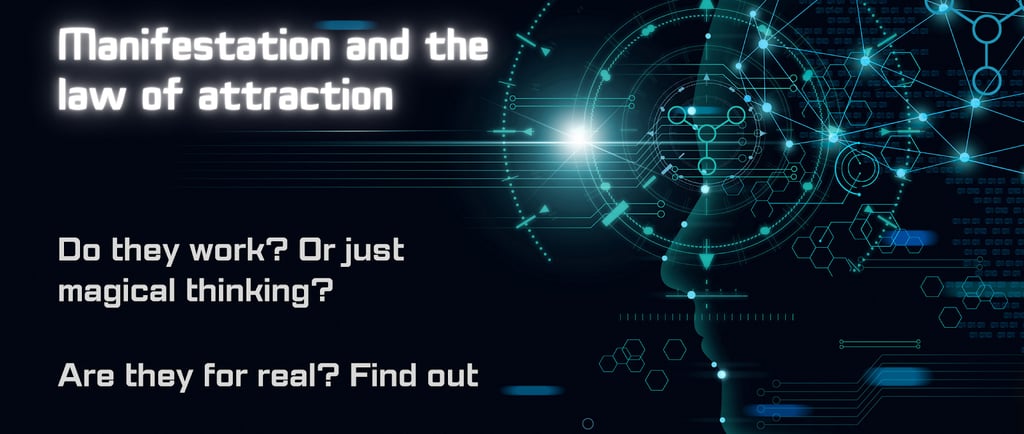Manifestations? Do they really work?
Here, I delve into the world of manifestations and try to find out if they truly work or are just figments of magical thinking.
Romit Dalal
3/5/20245 min read


Have you ever had a conversation that sparked a new way of thinking? That's exactly what happened to me one evening while speaking with a friend on the phone. We didn't precisely stumble onto the topic of manifestations - the idea that you can attract into your life whatever you focus on - but it was something my friend particularly requested we talk about, and my interest peaked. As someone who values integrity and critical thinking, I set out on a journey to discover the truth underlying manifestations, inspired by personal experiences and a combination of scientific investigation and introspection.
A lot of people have been talking about manifestations lately. Manifestations are the process of attracting something material into your life through belief and attraction. It's a simple yet deep concept: you may allegedly attract a certain goal into your life by concentrating your thoughts, feelings, and intentions toward it. That seems almost too wonderful to be true, doesn't it? And that's where the key question lies: are manifestations truly effective, or are they just the result of delusional thoughts?
Supporting Theories
It's true that some scientific theories provide evidence in favor of the efficacy of manifestations.
some supporting theories and explanations:
Quantum Physics: Some proponents of manifestation draw upon principles from quantum physics to support their claims. They argue that the universe operates based on vibrational energy and that our thoughts and feelings emit vibrations that attract similar energies. Therefore, focusing on positive thoughts can supposedly align one's energy with desired outcomes.
Self-Fulfilling Prophecy: This theory suggests that individuals' beliefs about themselves and their abilities can influence their behavior and ultimately lead to outcomes that align with those beliefs.
Studies on the placebo effect also demonstrate the power of belief in shaping our reality, with patients experiencing tangible improvements simply by believing in the efficacy of a treatment.
“The Secret”
In "The Secret," the law of attraction is presented as a fundamental principle governing the universe. According to the book, the law of attraction states that like attracts like, meaning that positive or negative thoughts and feelings attract corresponding positive or negative experiences into one's life.
The book suggests that visualizing specific goals and desires as if they have already been achieved can help manifest those desires into reality. For instance, envisioning oneself in a successful career or a fulfilling relationship supposedly attracts opportunities and experiences that align with those visualizations.
The book also advocates for the use of positive affirmations—repeated statements affirming desired outcomes—to shift one's mindset and attract positive experiences. For example, regularly affirming statements like "I am worthy of love and success" is believed to foster a mindset conducive to attracting love and success into one's life.
Skepticism
It's important to note that while "The Secret" and the law of attraction have gained popularity, they also have critics who argue that they oversimplify complex issues and may promote a passive approach to achieving goals. Additionally, scientific evidence supporting the claims of manifestation and the law of attraction is limited.
One of the primary criticisms is the lack of empirical evidence supporting the claims of the law of attraction. While anecdotal evidence and personal testimonials are often cited, there is a dearth of scientific studies demonstrating the effectiveness of manifestation techniques in producing tangible outcomes.
Critics argue that the law of attraction can inadvertently blame individuals for their misfortunes, suggesting that negative experiences are solely the result of negative thinking.
Skeptics contend that the law of attraction promotes a form of magical thinking, wherein individuals believe they can manifest their desires simply by thinking positively or visualizing outcomes. This perspective overlooks the complexities of real-world challenges and the need for concrete actions to achieve goals.
"The Secret" and similar teachings often present success stories as evidence of the law of attraction in action. Critics argue that this oversimplifies the factors contributing to success, such as hard work, perseverance, access to resources, and social networks.
Personal Experience & Belief
In my own experience, I'm not much of a believer in the concept of manifestations per se. While there have been moments when opportunities presented themselves seemingly out of nowhere and goals that once felt out of reach suddenly became attainable,they have been so rare that crediting the power of manifestations seems plausible.
I am a firm believer in the concept of creating goals and taking action toward them on a daily basis, with the belief that I can achieve them if I stay the course and continue to do what is necessary in the long run. Some may relate it to the law of attraction, which states that my belief in my goals and in myself function as catalysts, propelling me further towards optimal possibilities, showcasing the power of manifestation. I don't believe it is true, at least in the long term. To maintain a degree of focus and dedication to long-term goals, more than just manifestations are required. It takes the right habits and willpower to continue pursuing something despite setbacks and temporary failures.
However, I believe that daily affirmations can be quite beneficial if used as a guiding light on your way to achieving your goals. They might serve as a reminder of why you are working towards a specific goal and what it means to you. However, in order to be effective, they must be particular and well-defined.
All of the books I've read and discussed on this subject have provided many theories, but the one that struck me as particularly reasonable is one that explores the concept of dopamine hits and false gratification. It states that the idea of imagining yourself having achieved your goals and targets and reeling in the feeling of achieving them gives your brain a dopamine hit, and the brain thinks that you have achieved it. Now that a particular goal has been accomplished, it does not need to work towards it with as much focus or energy. It provides false gratification , which reduces the brain's desire to take the necessary actions to achieve the stated goal. According to this theory, manifestation is an impediment to achieving your ambitions and goals.
It promotes focusing on the journey and the little action steps that must be completed on a daily basis in order to extract the dopamine hit from the process itself and delay the gratification until the goal is reached.
Practical Tips for Harnessing the Power of Manifestations:
Set Clear Intentions: Clearly define your goals and desires, ensuring they are specific, measurable, and achievable.
Take Action: Manifestations are not a substitute for action. Take proactive steps towards your goals, breaking them down into manageable tasks and consistently working towards them.
Practice Daily Affirmations: Incorporate positive affirmations into your daily routine to reinforce your beliefs and align your thoughts with your goals. Repeat these affirmations with conviction and belief in their truth.
Stay Flexible: Remain open to unexpected opportunities and detours along your journey. Sometimes, the universe has a way of delivering our desires in ways we least expect.
Conclusion
Manifestations are not a one-size-fits-all solution. What works for one person may not yield the same results for another. It's essential to recognize that while our thoughts and beliefs can influence our reality to some extent, external factors beyond our control also play a significant role. Blind faith in manifestations without acknowledging this complexity can set unrealistic expectations and ultimately lead to disappointment.
In summary, manifestations are complex and have a dual nature. They can be strong forces for good when handled intentionally and mindfully, but they can also trick us by giving us false hope and control over our experiences. In the end, each person must investigate and determine whether manifestations actually function for themselves, using their own experiences and an open mind to guide them.
What are your thoughts about the power of manifestations? Do you think they work, or is it just some magical thinking? Or do you have a personal experience that you want to share? Let me know in the comments below.
Thank you for reading. Have a great day!!
